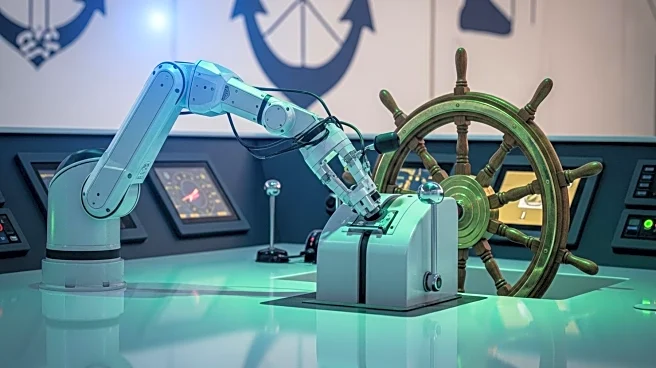What's Happening?
At the Maritime CEO Forum in Singapore, industry leaders discussed the transformative impact of artificial intelligence (AI) and digitalisation on the maritime workforce. The panel, moderated by Mark Charman of Faststream Recruitment, included experts like Marco Camporeale from Inmarsat and Su Yin Anand from IBM Consulting. They explored how AI is reshaping job roles, emphasizing the need for upskilling and maintaining human judgment in operations. The discussion highlighted that while AI can streamline operations and assist in decision-making, the human element remains crucial. The panelists stressed the importance of balancing technological advancements with human skills, such as situational awareness and problem-solving, to ensure safety and productivity in the maritime sector.
Why It's Important?
The integration of AI in the maritime industry is significant as it promises to enhance operational efficiency and safety. However, it also poses challenges, such as potential job displacement and the need for new skill sets. The forum underscored the necessity for the industry to adapt by investing in training and development to prepare the workforce for an AI-driven future. This transition is crucial for maintaining competitiveness and ensuring that the maritime sector can meet the demands of modern shipping, which increasingly relies on data-driven and tech-enabled operations. The discussion also highlighted the broader implications for workforce management, including the need for diversity and generational inclusion to foster innovation.
What's Next?
As the maritime industry continues to adopt AI technologies, companies are expected to focus on upskilling their workforce to handle new digital tools and systems. This includes enhancing technical proficiency and ensuring that employees are comfortable with AI as a co-worker rather than a replacement. The industry may also see changes in recruitment strategies, prioritizing candidates with digital literacy and data analysis skills. Additionally, there is a call for regulatory bodies to update training and safety protocols to keep pace with technological advancements. Companies will need to balance technological integration with human oversight to mitigate risks associated with increased cognitive load and potential data overload.
Beyond the Headlines
The forum also touched on ethical and cultural dimensions, such as the risk of exacerbating crew fatigue through data overload and the importance of considering crew input in technology adoption. The discussion highlighted the need for a cultural shift in the industry to embrace diversity and inclusion, which can drive innovation and better decision-making. Furthermore, the slow pace of regulatory adaptation poses a challenge, as existing protocols may not adequately address the complexities introduced by AI and digitalisation. The maritime sector must navigate these challenges to ensure a sustainable and equitable future for its workforce.











